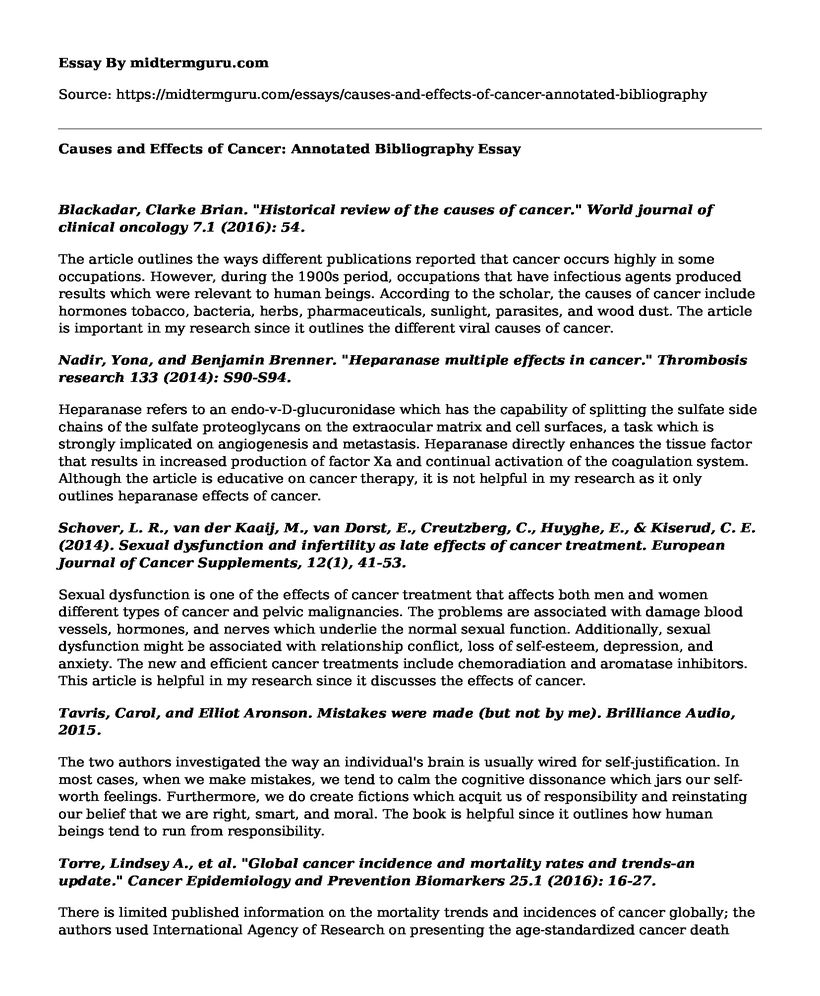Blackadar, Clarke Brian. "Historical review of the causes of cancer." World journal of clinical oncology 7.1 (2016): 54.
The article outlines the ways different publications reported that cancer occurs highly in some occupations. However, during the 1900s period, occupations that have infectious agents produced results which were relevant to human beings. According to the scholar, the causes of cancer include hormones tobacco, bacteria, herbs, pharmaceuticals, sunlight, parasites, and wood dust. The article is important in my research since it outlines the different viral causes of cancer.
Nadir, Yona, and Benjamin Brenner. "Heparanase multiple effects in cancer." Thrombosis research 133 (2014): S90-S94.
Heparanase refers to an endo-v-D-glucuronidase which has the capability of splitting the sulfate side chains of the sulfate proteoglycans on the extraocular matrix and cell surfaces, a task which is strongly implicated on angiogenesis and metastasis. Heparanase directly enhances the tissue factor that results in increased production of factor Xa and continual activation of the coagulation system. Although the article is educative on cancer therapy, it is not helpful in my research as it only outlines heparanase effects of cancer.
Schover, L. R., van der Kaaij, M., van Dorst, E., Creutzberg, C., Huyghe, E., & Kiserud, C. E. (2014). Sexual dysfunction and infertility as late effects of cancer treatment. European Journal of Cancer Supplements, 12(1), 41-53.
Sexual dysfunction is one of the effects of cancer treatment that affects both men and women different types of cancer and pelvic malignancies. The problems are associated with damage blood vessels, hormones, and nerves which underlie the normal sexual function. Additionally, sexual dysfunction might be associated with relationship conflict, loss of self-esteem, depression, and anxiety. The new and efficient cancer treatments include chemoradiation and aromatase inhibitors. This article is helpful in my research since it discusses the effects of cancer.
Tavris, Carol, and Elliot Aronson. Mistakes were made (but not by me). Brilliance Audio, 2015.
The two authors investigated the way an individual's brain is usually wired for self-justification. In most cases, when we make mistakes, we tend to calm the cognitive dissonance which jars our self-worth feelings. Furthermore, we do create fictions which acquit us of responsibility and reinstating our belief that we are right, smart, and moral. The book is helpful since it outlines how human beings tend to run from responsibility.
Torre, Lindsey A., et al. "Global cancer incidence and mortality rates and trends-an update." Cancer Epidemiology and Prevention Biomarkers 25.1 (2016): 16-27.
There is limited published information on the mortality trends and incidences of cancer globally; the authors used International Agency of Research on presenting the age-standardized cancer death rates and incidences from 2003-2007 and from 2007 to 2012 in five continents. According to the research the High-Income Countries (HICs) have high cancer rates, and they are mainly affected with prostate, lung, breast, and colorectal cancer. For the Low and middle-income countries (LMICs), they are mainly affected with cervical, stomach. Esophageal, and liver cancer. The article is essential in my research because it outlines the main causes of cancer in LMICs and HICs.
Vineis, Paolo, and Bernard W. Stewart. "How do we judge what causes cancer? The meat controversy." International journal of cancer 138.10 (2016): 2309-2311.
Obesity and taking of processed meat are regarded as harmful to human beings. In the case of cancer, there is only one because which is an infectious agent for infectious diseases. However, for non-infectious illnesses, the causes include high cholesterol, high blood pressure, and tobacco smoking. Hence, it means that even a nonsmoker can get cancer (lung) though it occurs in minimal circumstances. This scholarly article is important in my research as it describes the historical evolution of cancer and cancer causation.
Vineis, Paolo, and Christopher P. Wild. "Global cancer patterns: causes and prevention." The Lancet 383.9916 (2014): 549-557.
Cancer is a growing global illness. An increased proportion currently falls on the people who are low-income earners and are in the middle-income countries. The globalization consequences of behaviors and economies add to the existing burden of cancer. The authors further argue that it is essential to prevent cancer disease using the primary prevention measures since it benefits all people other than the ones who are targeted directly. The article is helpful in my research since it outlines the measures that can be used in preventing cancer.
Cite this page
Causes and Effects of Cancer: Annotated Bibliography. (2022, Sep 19). Retrieved from https://midtermguru.com/essays/causes-and-effects-of-cancer-annotated-bibliography
If you are the original author of this essay and no longer wish to have it published on the midtermguru.com website, please click below to request its removal:
- Implications of Nursing Theory in Validating Research Knowledge Towards Evidence-Based Practice
- Research Paper on Gastric Cancer
- Personal Reflection Paper for Nutrition
- Essay Sample on Adult Family Home
- Re-Defining Nursing Education: Innovations for Student Engagement - Essay Sample
- Aspirin: An Affordable Miracle Drug for Pain & More - Essay Sample
- CPOE: Enhancing Patient Safety & Reducing Errors in Healthcare - Essay Sample







